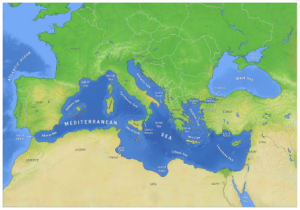Context:
Extreme heat has been observed in the Mediterranean for weeks, resulting in wildfires from Algeria to Greece.
Why are High Sea Temperatures a Problem?

- Suffocation Issue: In a warming world, marine creatures are in danger of suffocating.
- Less Availability of Oxygen: The warmer the water, the less oxygen is available to breathe, since gases like oxygen and carbon dioxide dissolve better at colder temperatures.
- Risk of Death by Starvation for Marine Life: The rise in temperature accelerates metabolism, and the organisms need more food to maintain this metabolic rate.
- Toxins for Marine Life: Algal blooms are more common in hotter waters and deplete oxygen levels and produce toxins harmful for marine life and eventually affect the entire ecosystem.
- High water temperatures are most harmful for animals living at the bottom of oceans, lakes or rivers.
- Scientists observed mass deaths of benthic species along thousands of kilometers of Mediterranean coastline between 2015 and 2019.
- Exception: Jellyfish are thriving because of higher temperatures, as well as nutrient run-off from farms and sewage.
What does Extreme Heat in the Mediterranean Mean for People?
- Affecting Fishing Activities in the Area
- Increase in Invasive Fishes
- Habitat loss
- Decline in Tourism
What Needs to be done about Rising Temperatures in the Mediterranean?
- Need to stop emitting greenhouse gases.
- Need to combat the growth of algal blooms which are worsened by run-off from agriculture, wastewater and industry.
- Need to strictly focus on achieving the UN goal of protecting 30% of the world’s oceans by 2030.
- Need to increase the number of strictly protected areas where fishing, diving and boating are not allowed and need to be properly managed.
- It is observed that well-protected areas are recovering faster and better from human disturbance.
- Some of the Mediterranean’s new inhabitants could also be a helpful addition as the planet heats up.
- Studies show that plants can deal with rising Mediterranean temperatures if they are intentionally exposed to heat as young seedlings.
News Source: The Indian Express
![]() 24 Aug 2023
24 Aug 2023

